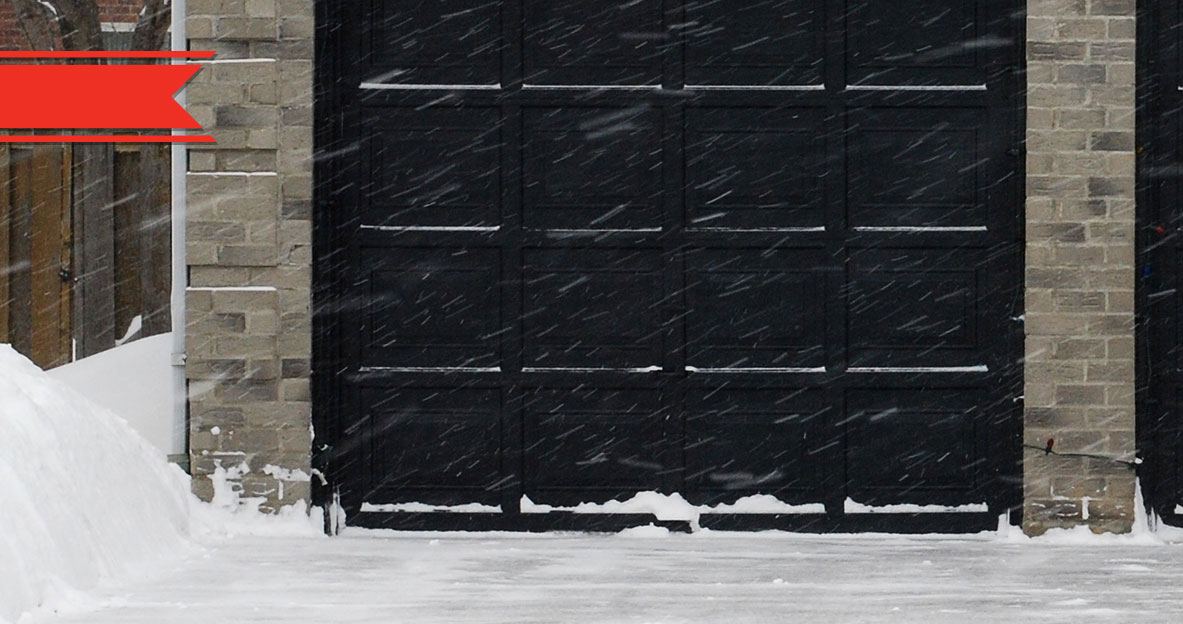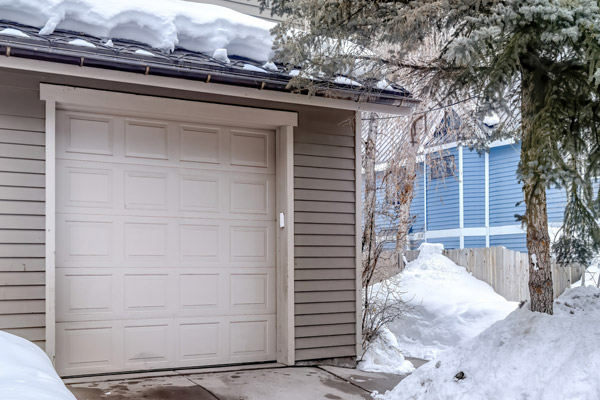Do you ever struggle with your garage door freezing shut during the winter? It can be such a hassle to deal with, but don’t worry! I’ve got some tips and tricks to help you prevent your garage door from freezing shut.
Keeping your garage door functioning smoothly in winter is essential for easy access to your car and storage space. So, let’s dive into a few simple steps you can take to ensure that your garage door stays operational even in the coldest of temperatures.
Ready to learn how to keep your garage door from freezing shut? Let’s get started!
Winter can often cause garage doors to freeze shut, making it difficult to access your vehicle or stored items. To prevent this issue, follow these steps:
- Apply a silicone-based lubricant to all moving parts of the garage door.
- Insulate the garage door by installing weatherstripping on the sides and bottom.
- Seal any gaps or cracks around the garage door to prevent cold air from entering.
- Keep the garage door closed as much as possible to retain heat.
- If the door is already frozen shut, use a heat gun or hairdryer to melt the ice.
By taking these preventative measures, you can keep your garage door functioning smoothly throughout the winter season.

How Can I Prevent My Garage Door from Freezing Shut in Winter?
Winter can bring cold temperatures and icy conditions, which can be particularly problematic for garage doors. If your garage door freezes shut in the winter, it can be a major inconvenience and even a safety hazard. However, there are steps you can take to prevent your garage door from freezing shut and ensure it operates smoothly even in the coldest weather. In this article, we will discuss effective strategies to keep your garage door working properly throughout the winter season.
1. Insulate Your Garage
One of the best ways to prevent your garage door from freezing shut in winter is to properly insulate your garage. Cold air can seep into the garage and cause the door to freeze to the ground. By insulating your garage, you can maintain a more stable temperature and minimize the chances of freezing. Consider adding insulation to the walls and ceiling of your garage, as well as weatherstripping around the garage door itself. This will help to keep the cold air out and prevent moisture from accumulating.
Another important step in insulating your garage is to ensure it is properly sealed. Check for any cracks or gaps around the windows, doors, and foundation of the garage. Seal these areas using caulk or weatherstripping to prevent drafts and keep the cold air out. A properly insulated and sealed garage will not only help prevent your garage door from freezing shut but also improve energy efficiency and reduce heating costs during the winter months.
Additionally, consider installing a garage door insulation kit. These kits typically consist of panels or insulation inserts that fit into the garage door, providing an added layer of insulation. This can help to maintain a more consistent temperature inside the garage and prevent freezing.
2. Lubricate Moving Parts
Another crucial step in preventing your garage door from freezing shut in winter is to regularly lubricate the moving parts. Cold temperatures can cause the lubricants to thicken or become less effective, leading to a stiff or frozen garage door. To avoid this, apply a silicone-based lubricant to the hinges, rollers, tracks, and springs of your garage door. This will help to keep the parts moving smoothly and prevent freezing.
Before lubricating, it’s important to clean the parts to remove any debris or dirt that may have accumulated. Use a mild detergent or a specific garage door cleaner to clean the tracks and other components. Once the parts are clean, apply the lubricant according to the manufacturer’s instructions. Be sure to use a silicone-based lubricant as it can withstand lower temperatures and will not harden or freeze like other types of lubricants.
In addition to regular lubrication, it’s also a good idea to check the condition of the moving parts on a regular basis. Look for any signs of wear or damage, such as worn-out rollers or loose hinges, and replace them if necessary. Keeping the moving parts of your garage door in good condition will not only prevent freezing but also extend the lifespan of the door and ensure smooth operation year-round.
3. Clear Ice and Snow Build-Up
Another common cause of garage doors freezing shut in winter is the build-up of ice and snow around the door. When snow accumulates in front of the garage or melts and refreezes, it can create a barrier that prevents the door from opening. To prevent this from happening, it’s important to regularly clear any ice and snow build-up from around the garage door.
Before attempting to clear the ice and snow, it’s essential to take safety precautions. Wear appropriate footwear with good traction to prevent slips and falls. Use a shovel or snow blower to remove the snow from the driveway and around the garage door. Be careful not to damage the door or its components while clearing the area. If necessary, use a de-icer or salt to melt any ice around the garage door, but avoid using excessive amounts as it can cause damage to the concrete or other surfaces.
Once the area is clear of ice and snow, apply a salt or sand mixture to create traction and prevent future accumulation. This will help to keep the area around the garage door clear and reduce the chances of the door freezing shut.
4. Use a Garage Door Heater
If you live in an area with extremely cold temperatures and frequent freezing, consider investing in a garage door heater. These devices are designed to generate heat around the garage door, preventing freezing and ensuring smooth operation. Garage door heaters are typically installed near the bottom of the door and use a heating element or a heat lamp to warm the area.
Before installing a garage door heater, consult with a professional to ensure proper placement and installation. They can help you determine the appropriate wattage and size for your specific garage door and climate. Keep in mind that garage door heaters may increase energy consumption and utility costs, so it’s important to consider the potential impact on your overall energy usage.
Using a garage door heater can provide reliable protection against freezing and improve the functionality of your garage door during the winter months. It’s a worthwhile investment for those living in areas with severe winter weather conditions.
“Key Takeaways” for preventing your garage door from freezing shut in winter:
- 1. Keep the garage door clean and free from moisture.
- 2. Apply a silicone-based lubricant on the garage door hinges and tracks.
- 3. Insulate the garage door by installing weatherstripping or a garage door insulation kit.
- 4. Use a garage door heater or space heater to keep the temperature above freezing inside the garage.
- 5. Clear any snow or ice buildup around the garage door.
Frequently Asked Questions
In winter, many people face the issue of their garage doors freezing shut. Here are some common questions and answers to help you prevent this from happening.
1. What causes a garage door to freeze shut in winter?
Garage doors can freeze shut in winter due to several factors. One main cause is the presence of moisture in and around the door. When the temperature drops, this moisture can freeze and cause the door to stick to the ground or its frame. Additionally, if the weatherstripping on your garage door is damaged or worn out, cold air can seep in, leading to freezing.
To prevent your garage door from freezing shut, it’s essential to address these factors. Keep the area around your garage door free from excess moisture, such as by removing snow and ice. Additionally, regularly inspect and replace damaged or worn weatherstripping to maintain a proper seal.
2. How can I prevent my garage door from freezing shut in winter?
To prevent your garage door from freezing shut in winter, there are several steps you can take. Firstly, apply a silicone-based lubricant on the weatherstripping, hinges, and rollers of your garage door. This will help reduce friction and prevent sticking. It’s important to use a silicone-based lubricant as other types may harden in cold temperatures.
Secondly, clear any snow or ice buildup around your garage door. Use a shovel or snow blower to remove snow from the area, including the path where the door closes. If you notice any ice forming around the garage door, use a de-icer or a mixture of salt and warm water to melt it away. Finally, ensure that the weatherstripping on your garage door is in good condition and replace it if necessary.
3. Can I use a space heater to prevent my garage door from freezing shut?
While using a space heater in your garage can help prevent freezing, it’s important to exercise caution and follow safety guidelines. The heater should be placed away from any flammable materials and never left unattended. Keep in mind that space heaters consume electricity, so monitor your energy usage and ensure your electrical system can handle the load.
Additionally, using a space heater alone may not be enough to prevent your garage door from freezing shut. It’s still crucial to take other preventative measures, such as applying lubricant and clearing snow or ice around the door.
4. Should I adjust the sensitivity of my garage door opener in winter?
During winter, it’s common for garage doors to experience increased resistance due to freezing. However, adjusting the sensitivity of your garage door opener may not be the best solution. Instead, focus on preventative measures to minimize the risk of freezing.
If your garage door opener has a sensitivity adjustment feature, consult the manufacturer’s instructions for guidance. However, keep in mind that adjusting the sensitivity too high can lead to safety concerns, such as the door not reversing if an object is detected. It’s always recommended to address the root causes of freezing, such as moisture and proper lubrication, to prevent issues with the garage door opener.
5. Can insulating my garage door prevent it from freezing shut?
Insulating your garage door can help minimize the chances of it freezing shut in winter. Proper insulation helps regulate the temperature inside the garage, reducing the formation of condensation and moisture that can contribute to freezing. Insulation also helps maintain a more consistent temperature, preventing the door from sticking to the cold frame or ground.
Consider adding insulation to your garage door if it’s not already insulated. There are various insulation options available, such as foam panels or reflective insulation kits, that can be easily installed. Additionally, insulation can also improve energy efficiency, keeping your garage warmer during winter and potentially reducing heating costs.

Summary
To prevent your garage door from freezing shut in winter, there are a few simple steps you can follow. First, make sure to clean the door tracks and remove any debris. Then, apply a silicone-based lubricant to the tracks and rollers to prevent them from freezing. Additionally, you can use a weatherstripping seal to create a tight seal around the garage door. Finally, consider insulating your garage door to help regulate the temperature inside and prevent freezing.
Remember, by taking these preventive measures, you can avoid the inconvenience and frustration of a frozen garage door during the winter months. Keep your garage door in good condition and ready to use, no matter how cold it gets outside.

